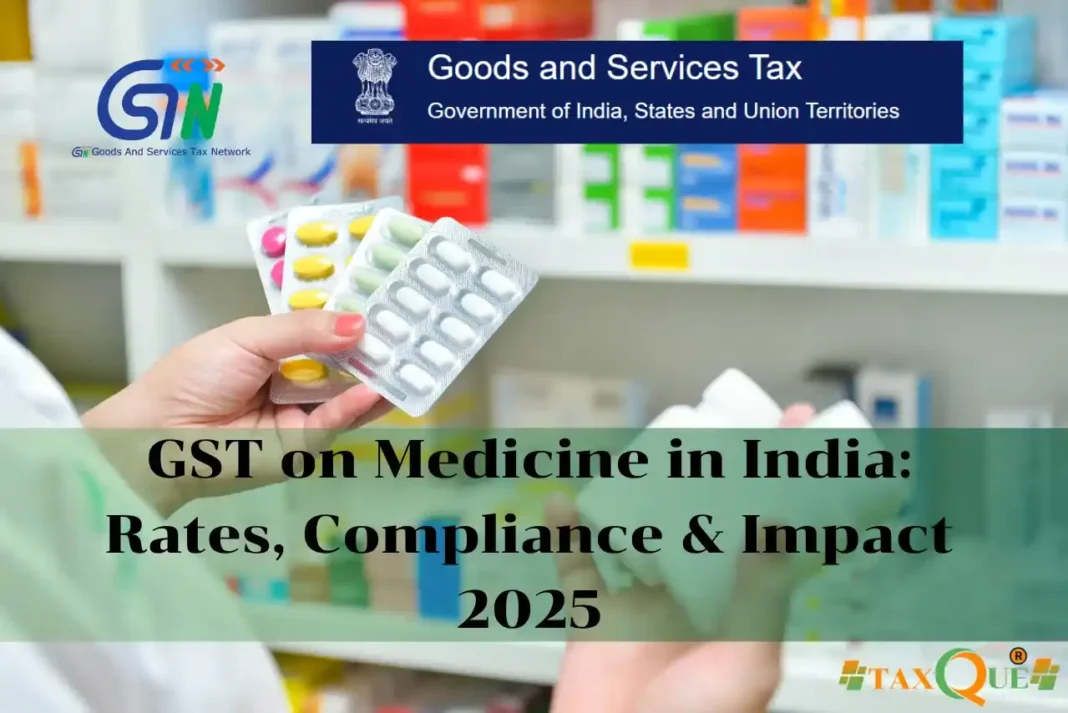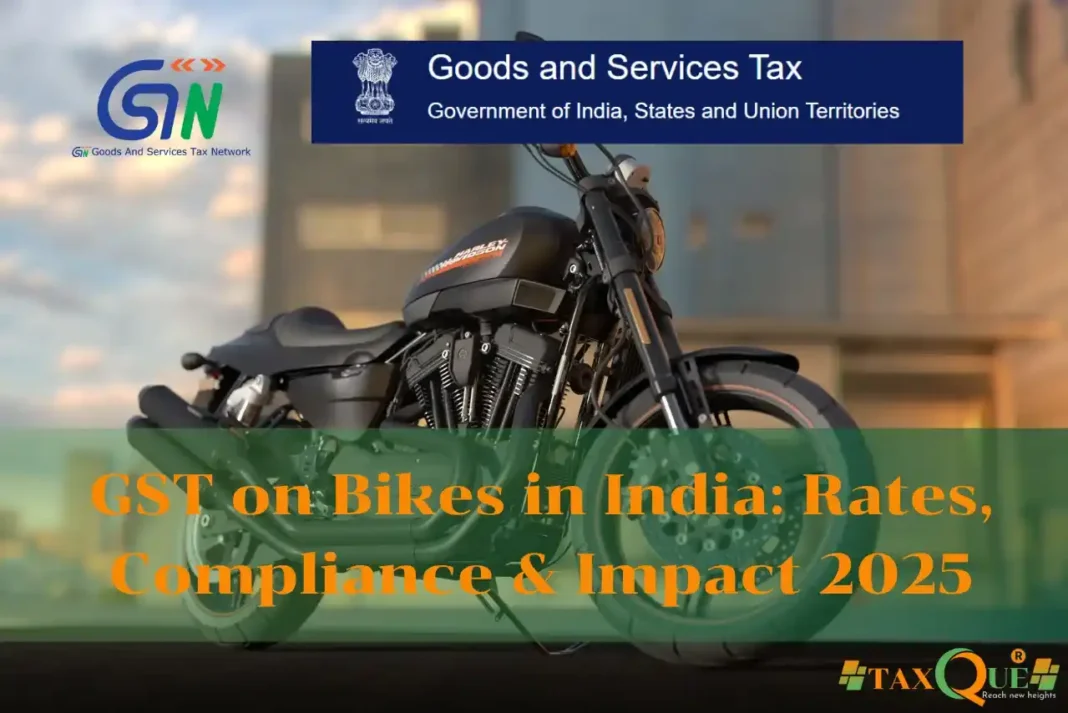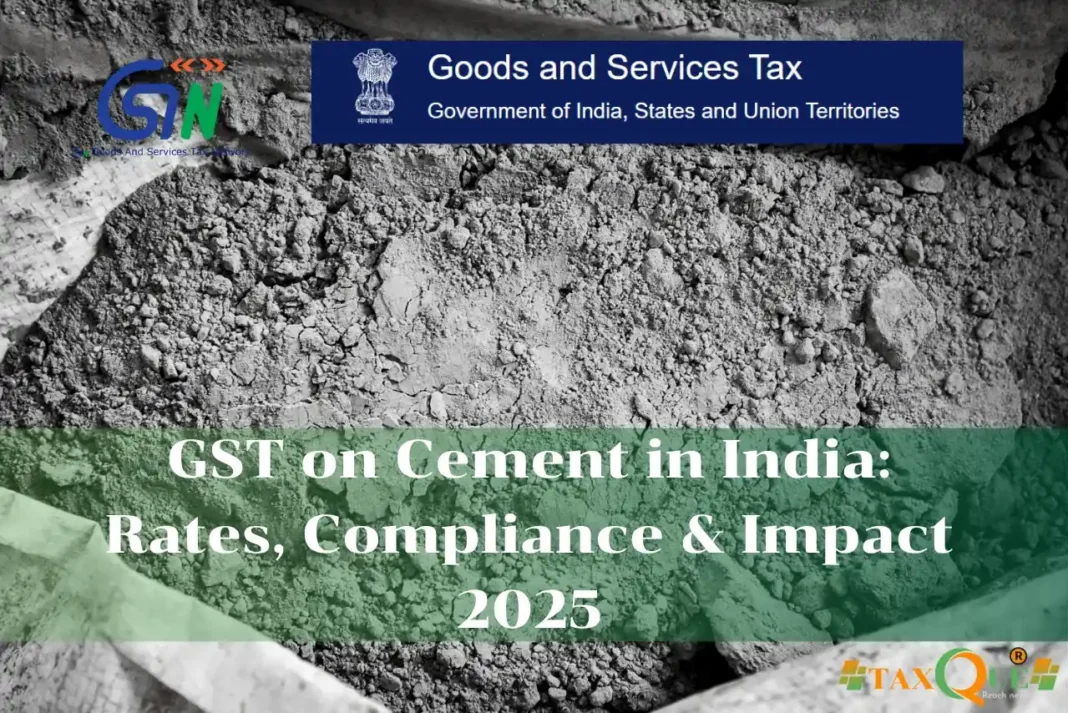Introduction
Understanding GST on medicine is essential for businesses and consumers in India navigating the Goods and Services Tax (GST) regime, effective since July 1, 2017. Medicines, critical for healthcare, attract varied GST rates under the CGST Act, 2017, impacting pricing and compliance for pharmaceutical companies and retailers in cities like Patna, Bangalore, and Hyderabad. This blog provides a comprehensive guide on GST on medicine in 2025, detailing rates, HSN codes, compliance requirements, and its effect on the pharmaceutical industry as of June 3, 2025, and highlights how TaxQue simplifies GST processes for businesses during company registration or operations.
What Is GST on Medicine?
GST on medicine refers to the tax levied under India’s GST framework on the supply of pharmaceutical products, including allopathic, ayurvedic, homoeopathic, and unani medicines, classified as goods. GST replaced a pre-GST tax structure (excise duty ~6%, VAT ~4–5%, totaling ~8–11%) with tiered rates, administered by the GST Council. Rates range from 0% to 18%, balancing affordability and revenue, affecting costs, compliance, and input tax credit (ITC) eligibility for businesses in the pharma sector, especially during company registration in Patna or Bangalore.
GST Rates and HSN Codes for Medicines
Below is a table summarizing GST on medicine rates and HSN codes for 2025:
| Medicine Type | GST Rate | HSN Code | Details |
|---|---|---|---|
| Life-Saving Drugs (e.g., Insulin, Vaccines) | 0% | 3004 | Essential drugs like insulin, anti-cancer, anti-HIV, and specified vaccines (e.g., Covaxin) are GST-free to ensure affordability. |
| Bulk Drugs & Formulations (Most Medicines) | 5% | 3003, 3004 | Common medicines (e.g., paracetamol, antibiotics, ayurvedic drugs) for human/animal use. Intra-state: 2.5% CGST + 2.5% SGST; Inter-state: 5% IGST. |
| Diagnostic Kits, Nicotine Gum | 12% | 3822, 3004 | Diagnostic kits, reagents, and nicotine replacement therapies (e.g., Nicotex gum). |
| Specified Formulations (e.g., Hair Oils, Toothpaste) | 18% | 3004, 3305 | Medicated hair oils, toothpaste, and certain high-end pharma products. |
- 0% Rate: Life-saving drugs (e.g., insulin, cancer treatments) are exempt to prioritize healthcare access. No GST on a ₹100 insulin vial.
- 5% Rate: Most medicines (e.g., paracetamol, ibuprofen) attract 5%, balancing affordability. A ₹200 antibiotic pack incurs ₹10 GST, totaling ₹210.
- 12% Rate: Diagnostic kits and nicotine gum face 12%, e.g., ₹60 GST on a ₹500 COVID-19 test kit.
- 18% Rate: Medicated products like toothpaste or hair oils are taxed at 18%, e.g., ₹90 GST on a ₹500 medicated shampoo.
- Note: As of June 3, 2025, rates remain unchanged since the 47th GST Council (July 2022). Industry demands for 0% GST on all medicines to reduce healthcare costs are pending, as per X posts.
Compliance and Input Tax Credit (ITC)
GST on medicine compliance involves:
- GST Registration: Mandatory for pharma businesses with turnover above ₹40 lakh (goods) or ₹20 lakh (services) in normal states like Bihar, or ₹20 lakh/₹10 lakh in special category states (e.g., Assam), via the GST portal.
- Invoicing: Invoices must include GSTIN, HSN code (e.g., 3004 for medicines), and GST amount (5%, 12%, or 18%). Intra-state splits into CGST + SGST; inter-state uses IGST.
- ITC Eligibility: Businesses can claim ITC on GST paid for medicines used in taxable supplies (e.g., ₹10 ITC on a ₹200 antibiotic pack at 5%), but not for exempt supplies (e.g., 0% life-saving drugs). ITC on inputs like APIs (18%) reduces costs.
- Reverse Charge Mechanism (RCM): If medicines or services (e.g., transport) are procured from unregistered suppliers, the registered buyer pays GST under RCM (e.g., 5% on medicines), claiming ITC later.
- Returns Filing: Report transactions in GSTR-1 (sales) and GSTR-3B (summary) monthly/quarterly, ensuring correct HSN and state codes (e.g., 29 for Karnataka).
- E-Way Bills: Required for inter-state medicine transport above ₹50,000, using state codes (e.g., 10 for Bihar).
- Penalties: Non-compliance incurs ₹10,000–₹25,000 fines, 18% interest, or legal action.
Impact on Businesses, Consumers, and the Pharma Sector
The GST on medicine has reshaped India’s pharmaceutical industry:
- Affordability: 0% GST on life-saving drugs and 5% on most medicines (versus pre-GST ~8–11%) lowers costs for consumers in Patna or Bangalore. A ₹500 medicine now incurs ₹25 GST (5%) versus ~₹50 pre-GST.
- Business Benefits: ITC on inputs (e.g., APIs at 18%) and simplified compliance via GSTN reduce costs for manufacturers like Sun Pharma or Cipla. Uniform rates nationwide streamline pricing.
- Compliance Challenges: RCM for unregistered suppliers and ITC restrictions on exempt drugs increase complexity for SMEs. X posts highlight demands for simpler compliance and 0% GST on all medicines.
- Economic Impact: The pharma sector, valued at ~$50 billion in 2025, benefits from GST’s unified market, boosting exports (~$27 billion). Revenue from 5–18% rates (~₹10,000 crore annually) supports healthcare initiatives.
- Company Registration: Pharma businesses registering in Bangalore or Hyderabad must align GSTINs with state codes (29, 36) and assess turnover against thresholds (₹40/20 lakh) for GST registration.
TaxQue simplifies GST on medicine compliance with expert support for GST registration, ITC claims, and return filing. Visit TaxQue’s GST compliance guide or company registration services for seamless solutions.
FAQs
1. What is the GST rate on most medicines in India?
The GST on medicine is 5% for most formulations (e.g., paracetamol, antibiotics) under HSN 3004.
2. Are life-saving drugs exempt from GST?
Yes, essential drugs like insulin and vaccines are GST-free (0%) to ensure affordability.
3. Can pharmacists claim ITC on medicine GST?
Yes, registered pharmacists can claim ITC on 5%, 12%, or 18% GST paid for medicines used in taxable sales, but not for 0% drugs.
4. Does RCM apply to medicine purchases?
Yes, if bought from unregistered suppliers, registered buyers pay GST (e.g., 5%) under RCM, claiming ITC later.
5. How does TaxQue assist with GST on medicine compliance?
TaxQue offers tools for GSTIN verification, RCM compliance, and return filing for pharma businesses. Explore TaxQue’s compliance services.
Conclusion
GST on medicine in India, ranging from 0% for life-saving drugs to 18% for medicated products, balances affordability and compliance in the pharmaceutical sector. With 5% on most medicines, businesses in Patna, Bangalore, and beyond benefit from ITC and a unified market, though RCM and compliance complexities persist. As of June 3, 2025, the pharma industry thrives, supported by platforms like TaxQue, which streamline GST on medicine compliance with expert tools for registration, invoicing, and return filing. Stay compliant, optimize ITC, and support India’s healthcare ecosystem in 2025.





